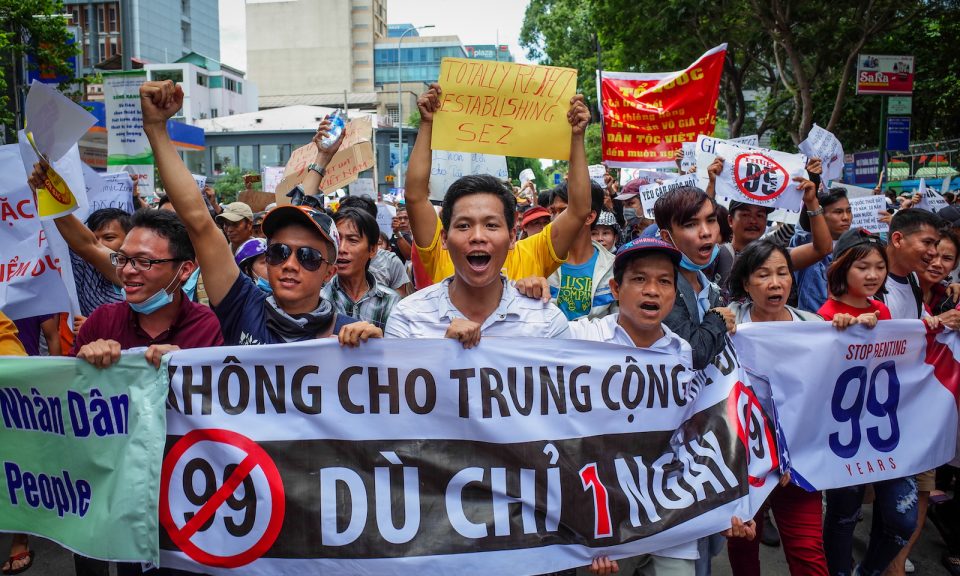Anti-Chinese protesters take to Vietnam’s streets
June 11, 2018 | Expert Insights

Police in Vietnam detained more than a dozen protesters in the capital Hanoi against plans for new special economic zones and a new cyber security law. China had once colonized Vietnam, and hence the protesters fear the zones would be dominated by Chinese investors.
Background
Bilateral relations between China and Vietnam have been turbulent, despite their common Sinospheric and socialist background. Centuries of conquest by modern China's imperial predecessor have given Vietnam a deep-rooted suspicion of Chinese attempts to dominate it. Though China assisted North Vietnam during the Vietnam War, relations between the two nations soured following Vietnam's reunification in 1975. China and Vietnam fought a prolonged border war from 1979 to 1990 but have since worked to improve their diplomatic and economic ties.
The Cambodian–Vietnamese War increased tensions with China, which had allied itself with the Democratic Kampuchea. This, and Vietnam's close ties to the Soviet Union, made China consider it a threat to its regional sphere of influence. With the collapse of the Soviet Union and Vietnam's exit from Cambodia in 1990, Sino-Vietnamese ties began improving. Since 1991, the leaders and high-ranking officials of both nations have exchanged visits. China and Vietnam both recognized and supported the post-1991 government of Cambodia and supported each other's bid to join the World Trade Organization (WTO).
In 2000, Vietnam and China successfully resolved longstanding disputes over their land border and maritime rights in the Gulf of Tonkin. In 2002, then Chinese President Jiang Zemin made an official visit to Vietnam, where numerous agreements were signed to expand trade and cooperation and resolve outstanding disputes.
However, the two countries remain in dispute over territorial issues in the South China Sea. China and Vietnam share a 1,281-kilometer border. A 2014 survey conducted by the Pew Research Center showed 84% of Vietnamese were concerned that territorial disputes between China and neighboring countries could lead to a military conflict.
Analysis
Protesters took to the streets in Vietnam on Sunday in rare demonstrations against special economic zones that some fear will favor Chinese investors. They also took the opportunity to protest against a planned cyber security law.
Social media posts showed large protests in Hanoi, the capital, Ho Chi Minh City, and other Vietnamese cities. Some of the protesters carried anti-Chinese banners or chanted slogans such as “No China” or “China get out”. “The 99-year land lease law will directly affect our sovereignty and allow us to fall to China,” Duong Dai Trieu Lam, who attended a protest in Ho Chi Minh City, told the Financial Times. “Our people could possibly lose 4,000 years of history and we could disappear from the world map.”
Vietnam plans to open three special economic zones in the country’s north, center, and southern Phu Quoc island where foreign investors will be offered generous incentives and be allowed to lease land for up to 99 years. While the draft legislation does not single out China, Vietnamese who oppose it have claimed it will allow government officials to give preferential treatment to Chinese investors.
The protests were thought to be the largest since the demonstrations that followed a 2016 toxic waste spill by the Taiwanese company Formosa Plastics at a steel plant, which contaminated more than 200km of Vietnam’s coastline.
The economic relations between Vietnam and China in recent years have been carried out in various forms. Besides the traditional forms such as trade, development aid, economic and technical cooperation between the two governments, there is also private economic cooperation which still is small in scale. The exchange of commodities across the land border has been developed extensively.
The industries of Vietnam heavily depend on China, most of the basic materials for manufacturing products of Vietnam (fabric, electronic components) are imported from China. China is known as the world’s factory currently, with the advantage on fast production, low price, competitive models, plenty of types. Therefore, import from China is a reasonable choice, both fast and convenient, creating a larger surplus value while preserving the environment.
In the face of public opposition last week, Vietnam’s government said that it might postpone parliamentary votes on the law on special economic zones. The cyber security law, which has drawn protests from Vietnamese activists and foreign technology companies and criticism from the US, is due to be discussed in the legislature later this week.
Assessment
Our assessment is that anti-Chinese sentiment runs high in Vietnam, which is especially at odds with Beijing about overlapping claims in the South China Sea. There is also an increased concern that foreign investment and OBOR infrastructure would be used to export surplus production of Chinese goods to countries that will be in the periphery, such as Vietnam, causing severe damage to local industries. We believe that Vietnam’s communist government could award Chinese investors leases in the three economic zones, which could thus be a pretext for Chinese control over the island of Van Don near their shared border as well as Chinese control of a number of islands in the South China Sea.








Comments